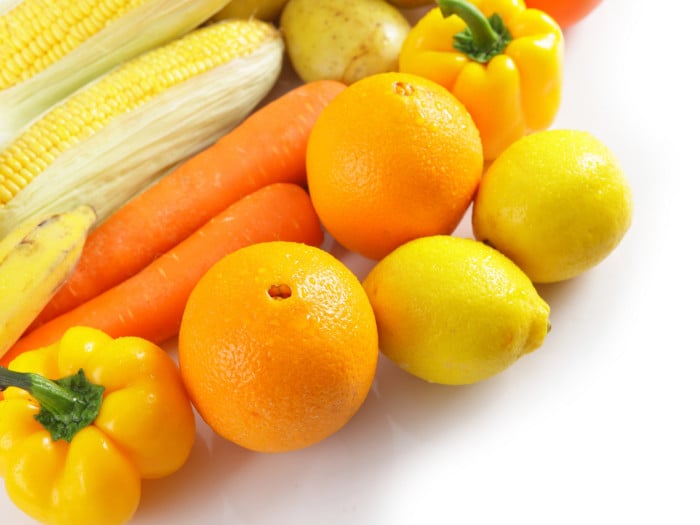Yellow vegetables are some of the healthiest foods we can put in our body, and it’s important to know which ones are the best!
What are Yellow Vegetables?
Yellow vegetables are those vegetables that are high in an antioxidant called beta-carotene which breaks down vitamin A in the body, an essential nutrient we need for health. Aside from that specific antioxidant, most colorful vegetables and fruits are rich in other nutrients as well, including potassium, iron, copper, vitamin C, vitamin A, and B complex vitamins, as well as dietary fiber and other antioxidants. [1]
Yellow Vegetable List
There are many yellow vegetables including carrots, yellow peppers, maize, pumpkin, golden beets, sweet potatoes, and more. Let us take a look at the many amazing yellow vegetables.
Yellow Peppers
Yellow peppers provide possibly high levels of antioxidants, as well as vitamin C and K, making them a great booster for the immune system.
Maize
Possibly high in vitamins A, B, and E, as well as dietary fiber, this vegetable is an excellent choice for improving gastrointestinal function and protecting vision health.
Pumpkins
These seasonal vegetables may be very high in vitamin A and C, as well as unique antioxidants such as cucurbitacin.
Squash
Squash is a great source of manganese, phosphorus, and other critical vitamins and minerals, which may help to build strong bones. [2]

Yellow food Photo Credit: Shutterstock
Yellow Tomatoes
With potentially high amounts of B vitamins and key antioxidants, yellow tomatoes can be an excellent means of boosting the immune system without the acidity of red tomatoes.
Golden Beets
Known for their possibly high levels of beta-carotene and vitamin A, golden beets may be great for detoxifying the body.
Yellow Cauliflower
Boasting possibly high levels of dietary fiber, omega-3 fatty acids, vitamin C, and vitamin K, these vegetables are great for heart health and digestion, among others. [3]
Delicata Squash
With loads of vitamin A and C, this squash variety may have no fat and is great for the immune system.
Yellow Beans
As a potentially good source of protein, manganese, iron, dietary fiber, and B vitamins, yellow beans are also low in fat and cholesterol.
Yellow Onion
The organic sulfur compounds in onions can have antioxidant effects on the body, in addition to various B vitamins that can help manage your metabolic activity. [4]
Sweet Potatoes
Possibly rich in carotenoids, vitamin A, and B vitamins, these potatoes are also great sources of fiber and can help prevent chronic diseases.
Yellow Potatoes
These potatoes may be a great source of vitamin D, vitamin C, manganese, and phosphorus, and are known to improve metabolism and the health of cell membranes.
Others
There are also some other yellow vegetables including yellow carrots, rutabagas, yellow summer squash, yellow winter squash, crookneck squash, dragon’s tongue beans, garden peach, Ho Chi Minh hot pepper, pattypan squash, spaghetti squash, touchstone gold beet, and Zephyr squash.
